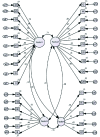Validity and Reliability of The Chedoke-McMaster Attitudes Towards Children with Handicaps Scale in Turkey: A Methodological Study
- PMID: 34263180
- PMCID: PMC7968459
- DOI: 10.5152/FNJN.2020.426719
Validity and Reliability of The Chedoke-McMaster Attitudes Towards Children with Handicaps Scale in Turkey: A Methodological Study
Abstract
Aim: The aim of this study was to examine the validity and reliability of the 'Chedoke-McMaster Attitudes Towards Children with Handicaps' scale in Turkey.
Method: A methodological study design was chosen. The data was collected in a primary and secondary school under Antalya Muratpaşa District's National Education Directorate. Schools with inclusive classes open to children with special educational needs were chosen using a random sampling method. Four hundred students in primary and secondary education between the ages of 9 and 13 were included in the study. Research data was collected from the chosen schools during the 2016-2017 spring semester. The Child's Descriptive Information Form and Chedoke-McMaster Attitudes Towards Children with Handicaps scale were used to collect data. Language and content validity, construct validity, internal consistency, and reliability analyzes were performed.
Results: It was determined that children who have a family member with disabilities had higher scores. The confirmatory factor analysis revealed that the Kaiser-Meyer-Olkin values were 0.90 and the chi-square value for the Barlett sphericity test was highly significant. The scale was reorganized into a four-factor structure featuring the following subscales: Interaction and Acceptance, Avoidance, Pity, and Sense of Affinity. The results of the analyzes confirm the new structure. The Cronbach's alpha value was 0.85.
Conclusion: The Chedoke-McMaster Attitudes Towards Children with Handicaps scale was found to be compatible with Turkish culture. The scale's new factors also reflect general attitudes existing within Turkish culture towards people with disabilities that require change.
Keywords: Attitudes measurement; children with disabilities; education; peer attitudes; reliability; validity.
Copyright © 2020 Florence Nightingale Journal of Nursing.
Conflict of interest statement
Conflict of Interest: The authors have no conflicts of interest to declare.
Figures
Similar articles
-
Rasch analysis of the Chedoke-McMaster Attitudes towards Children with Handicaps scale.Disabil Rehabil. 2017 Feb;39(3):281-290. doi: 10.3109/09638288.2016.1140833. Epub 2016 Feb 16. Disabil Rehabil. 2017. PMID: 26882846
-
Factorial validity of the Chedoke-McMaster Attitudes towards Children with Handicaps Scale (CATCH).Res Dev Disabil. 2013 Apr;34(4):1336-45. doi: 10.1016/j.ridd.2013.01.007. Epub 2013 Feb 14. Res Dev Disabil. 2013. PMID: 23417138
-
Rasch Validation of the Arabic Version of the Chedoke-McMaster Attitudes Toward Children With Handicaps (CATCH-AR) Scale.Front Psychol. 2020 Jan 24;10:2924. doi: 10.3389/fpsyg.2019.02924. eCollection 2019. Front Psychol. 2020. PMID: 32038354 Free PMC article.
-
Validity and Reliability of the Neonatal Palliative Care Attitude Scale in Turkey.Florence Nightingale J Nurs. 2021 Jun 1;29(2):212-220. doi: 10.5152/FNJN.2021.20041. eCollection 2021 Jun. Florence Nightingale J Nurs. 2021. PMID: 34263240 Free PMC article.
-
Measuring children's attitudes towards peers with disabilities: a review of instruments.Dev Med Child Neurol. 2008 Mar;50(3):182-9. doi: 10.1111/j.1469-8749.2008.02032.x. Epub 2008 Feb 8. Dev Med Child Neurol. 2008. PMID: 18261111 Review.
Cited by
-
Exploring Physical Activity in Children and Adolescents with Disabilities: A Bibliometric Review of Current Status, Guidelines, Perceived Barriers, and Facilitators and Future Directions.Healthcare (Basel). 2024 May 1;12(9):934. doi: 10.3390/healthcare12090934. Healthcare (Basel). 2024. PMID: 38727491 Free PMC article. Review.
References
-
- Alves S, Lopes-dos-Santos P. Measuring Students’ Attitudes Towards Peers with Disabilities Using a Portuguese Version of the CATCH Scale. Meeting of the European Conference on Educational Research; 2013. Retrieved from https://www.eera-ecer.de/ecer-programmes/conference/8/contribution/22467/
LinkOut - more resources
Full Text Sources
Medical


